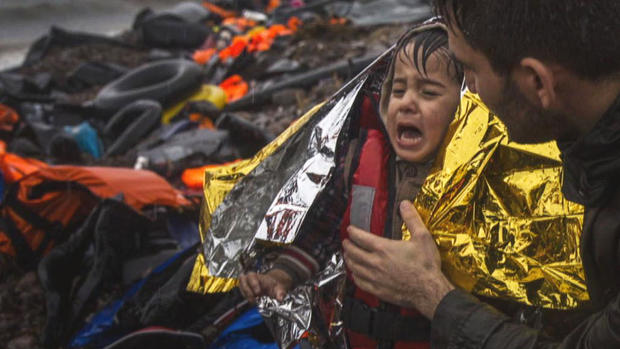Migrants pour into grim camps as Balkan states bicker
BREZICE, Slovenia -- Thousands of migrants flooded into Slovenia on Tuesday, as Slovenia and Croatia traded accusations over who is to blame for the exodus that has overwhelmed the Balkans and shaken the European Union to its core.
Slovenian police on horseback and in riot gear surrounded hundreds of newcomers in a muddy field near the border village of Rigonce, herding them on a 9-mile trek to the nearest overcrowded reception area. Some of the refugees wrapped themselves in blankets to ward off the cold.
Slovenia's Interior Ministry said Croat police were dumping thousands of undocumented people on its border "without control," and were ignoring telephoned Slovene requests to contain the surge. The Croats countered that only half of the asylum seekers on its soil were being delivered north, and they accused the Slovenes of ignoring messages too.
"The pressure of immigrants arriving from Croatia is intensifying," the Slovenian government said.
Slovenia has faced a surge of migration across its southern border since Saturday, when Hungary sealed its border with Croatia. Most people fleeing war and poverty in the Middle East, Africa and Asia say they want to seek refuge in Germany, Sweden or other wealthy parts of Western Europe that offer better support to asylum-seekers.
Croatian Interior Minister Ranko Ostojic told The Associated Press that his officials repeatedly had asked Slovene police "where they want to receive the refugees," but had yet to receive a reply. Slovene officials insisted the reverse was true.
While Slovenia says it can handle only 2,500 migrants a day, its police force said around 8,300 migrants seeking to head toward Western Europe already were in its reception centers, with thousands more arriving by the hour.
Croatia did not seem inclined to halt the flow. On Tuesday morning, a train carrying more than 1,000 people from the Croatian town of Tovarnik and some 20 buses of full of refugees from the Opatovac refugee camp were headed toward the Slovenian border.
Ostojic said Croatia expects Slovenia each day to accept about half of the total migrants traveling through Croatia.
"If we are receiving 10,000, then 5,000 people have to be transited to Slovenia. If the number in Croatia is 5,000, then it's 2,500, or 50 percent," he said.
Ostojic said more than 204,000 migrants had reached Croatia this year, the vast majority of them since Sept. 15, when Hungary shut down its border with Serbia. Some 2,600 are currently in refugee camps and 2,500 were waiting in the Croatian village of Bapska to be taken by bus to the border with Slovenia.
Slovenia's parliament is expected to decide later Tuesday on a proposal to allow the army to assist police with border control.
The Slovene government said 8,000 migrants arrived Monday and at least 4,000 more, including many babies and young children, came early Tuesday. The government pleaded for help from partners in the 28-nation European Union.
"Slovenia is publicly calling on member states and European institutions to become actively involved in taking on the unevenly distributed burden that Slovenia is under," the government said. "It is delusional to expect a country with a population of 2 million to stop, regulate and resolve what much bigger member states have failed to do."
Not a single migrant has entered Hungary from Croatia since the border was closed Saturday with a fence protected by razor wire, soldiers and police patrols.
European nations are increasingly are warning newcomers to expect a difficult time and a high risk of deportation if they cannot prove they faced credible dangers back home.
The Dutch government said Tuesday that asylum-seekers, 2,200 of whom arrived last week alone, face lengthy delays and life in makeshift accommodation as their applications are processed. It published a new letter being handed to refugees warning that Holland's housing shortage meant they would experience "an austere reception, such as in sports centers or tents, where many people share the same lodgings."
Dutch Junior Justice Minister Klaas Dijkhoff said asylum-seekers faced an average wait of a year for a judgment of their application. He said even those granted asylum might be assigned to long-term housing in converted shipping containers or disused office blocks.
